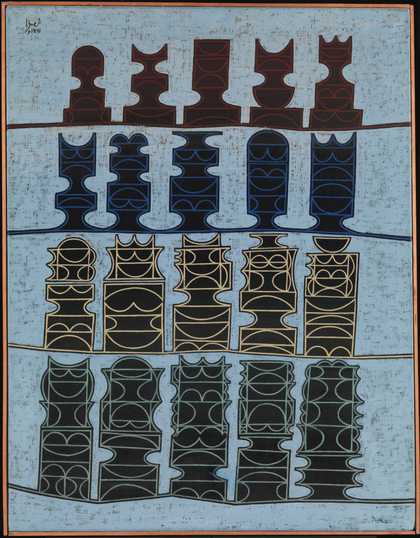An intimate evening of conversation and reflection on the work of pioneering painter Anwar Shemza, who moved from Lahore to Britain in 1956. Taking place within the Shemza display at Tate Britain, this discussion, chaired by Amna Malik (UCL) features panellists including artist Aphra Shemza and Iftikhar Dadi (Cornell), editor of the recent Shemza monograph and artist Shezad Dawood. How did Shemza’s experience of migration and diaspora affect his painting? What was his relationship with the work of other artists of his era? Where can his influence be found today?
Followed by a drinks reception.
With support from the Estate of Anwar Jalal Shemza and Jhaveri Contemporary.
Biographies
Iftikhar Dadi
Iftikhar Dadi is Associate Professor at Cornell University in the Department of History of Art. He also served as Chair of the Department of Art (2010–14). Publications include the book Modernism and the Art of Muslim South Asia (2010), the edited monograph Anwar Jalal Shemza (2015), and essays in numerous journals and edited volumes. Co-curated exhibitions include Lines of Control (2012) and Unpacking Europe (2001). As an artist he collaborates with Elizabeth Dadi, they have shown widely internationally.
Shezad Dawood
Shezad Dawood is an artist/film-maker, who looks at the compiling, layering and editing of multiple narratives across his films, paintings and sculptural works. His collaborative film projects derive from extended periods of time investigating particular locales, involving their communities in fictions of place. These fictions often use genre as a fantastical prism by which to reflect on both lived and imagined ways of being, a kind of alter-documentary. Key themes in his work include performing cinema, the (an-)archive, and an inquiry into modes of perception and how they move across the spectrum of the alchemical and the digital, figuration and abstraction and what it means to make images and texts at this moment in time.
Amna Malik
Amna Malik is Senior Lecturer in History and Theory of Art at the Slade School of Fine Art, UCL. She specialises in twentieth century and contemporary art and diaspora and has published a number of essays on African American, Black British, South Asian and Middle Eastern artists in Europe and the U.S. A recent online project 'Transnational Slade: mapping the diaspora of an art school’ examines the presence of Asian and African artists at the Slade in the 1950s. Amna is currently working on a book which examines aesthetics and art practice across diasporas from Africa, Asia and the Middle East.
Aphra Shemza
Aphra Shemza is a London based artist who works with multi-media, light art, kinetic sculpture and interactive installation. Since graduating from her BA Fine Art Degree in 2012, Aphra Shemza has exhibited in a number of exhibitions in and around London and often exhibits work with Kinetica Museum and the Lights of Soho gallery. Her work has been featured in a number of publications and press, most notably Tate Etc., GQ Magazine and Time Out. Shemza’s work focuses on abstract, geometric and scientific research and often involves technology to translate these concepts to an audience. The way in which the viewer responds to the work is key to how it is produced; it is their interactivity with her art that makes the pieces come to life, allowing the viewers to become an active spectators.

